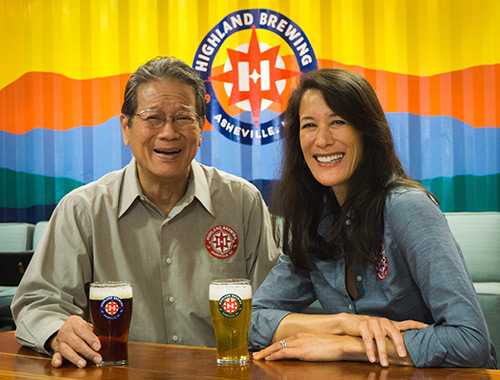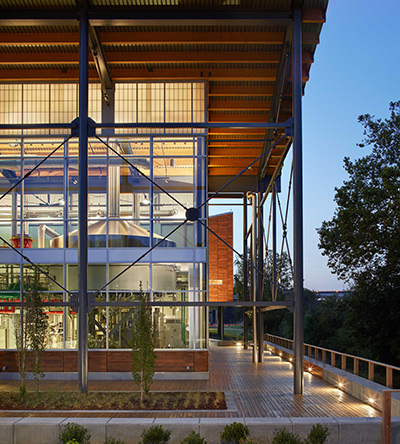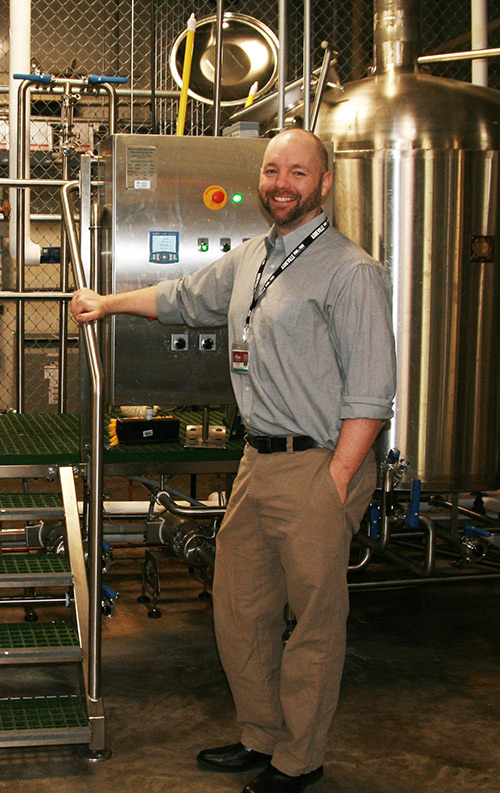A hopping industry
While New Belgium Brewing Co. is headquartered in Fort Collins, Colo., western North Carolina’s strong craft-beer community and stellar quality of life persuaded the employee-owned brewery to open a $140 million location in Asheville in 2016.
Western North Carolina’s billion-dollar craft-beer industry attracts national brands looking for a strong business environment and excellent quality of life.
Quick Look: Western North Carolina boasts a booming beer community, strong business environment and desirable quality of life.
Note: After time of publication, New Belgium Brewing announced plans to sell to Australian-based Lion Little World Beverages for an undisclosed amount.
By Marla Hardee Milling
Here’s a secret about the exploding billion-dollar-a-year craft-beer industry in western North Carolina: Competitors genuinely want each other to succeed. They compete fiercely, but when a new brewery moves into town, they’ll roll out the welcome mat and offer tips born from years of experience as well as trial and error. Even as they focus on individual business-success strategies, you’re just as likely to see brewery owners and beer-makers seated around a table together, enjoying a cold one at the end of the day as they discuss collaborations and admire the quality of each other’s brewing finesse.
This congeniality certainly fits into the Asheville vibe, but the willingness to work together and push each other to higher levels benefits the entire industry. Brewers in Asheville and surrounding towns will tell you there’s no room for mediocre beer here.
“If you come here, you’d better make fantastic beer,” says Mike Rangel, owner of Asheville Brewing Co. and interim executive director of the Asheville Brewers Alliance. “If we decided to go to Philadelphia and open a cheesesteak business, people would be like, ‘Why are you moving to Philadelphia? You’re going into the big guns.’ If you’re coming to Asheville, you better be able to market, you better have a great connection with nonprofits, you better treat your employees well, you better be green — all those sorts of things. And that’s before you even get to the point of how your beer tastes.”
“We compete like hell here,” Rangel continues, but says he learned early in the game to follow the lead of Oscar Wong, who showed everyone that being kind and helpful was the best path.
It’s impossible to recognize Asheville’s rise as “Beer City USA” without talking about Wong. He laid the groundwork for the craft-beer industry in Asheville when he founded Highland Brewing Co. in a 2,000-square-foot space in the basement of Barley’s Taproom & Pizzeria on Biltmore Avenue in 1994. The business is now housed in an expansive 180,000-square-foot location in east Asheville situated on 40 acres. Highland, now the state’s largest craft brewery, produces about 50,000 barrels of beer a year and has 60 full-time and 20 part-time employees.
“We basically saw that with Oscar, you could be a good guy, you could be a family person, you could be a credit to Asheville and still be a competitive businessperson,” Rangel says. “Oscar was the first here, and he basically said, ‘Hey, I’d like this to be a gentlemanly pursuit.’”

Independent and family-owned Highland Brewing Co. was founded by Oscar Wong in Asheville in 1994. Led by his daughter, President and CEO Leah Wong Ashburn, Highland is now the largest brewer based in the state.
Wong’s daughter, Leah Wong Ashburn, has taken the reins from her dad, serving as Highland’s president and CEO. Female leadership is also strong at breweries like New Belgium Brewing Co., with founder Kim Jordan and women in many key management roles. While New Belgium is headquartered in Fort Collins, Colo., the national brewer boasts a second location in Asheville. The trend for female brewers is also on the rise. Jeff “Puff” Irvin, director of the Craft Beverage Institute of the Southeast at Asheville-Buncombe Technical Community College, says, “We’ve been averaging 20% to 25% women in the program since it started.” The Institute prepares students for careers in brewery and distillery operations and management, distribution, sales and marketing, and self-employment opportunities including opening their own craft beverage facility.
Another trend in the beer industry includes the increasing need for more highly trained workers to oversee increasingly complex machinery, which is expensive. Ashburn notes the demand for technicians who can run machines that break down and identify contaminants.
“There are bugs all over us and yeast and things in the air,” she says. “The brewing process is very closed, but it is possible, once in a while, to get things in the beer just from air and people. Some of those things are beer spoilers, and we want to keep those things out. So, we are constantly testing our beer. We taste every batch three times before it goes out the door. If we know something is off, we can look at the DNA and identify exactly what it is.”
“Our quality approach is way beyond any brewery our size. Way beyond,” Wong says. “We feel strongly that over time, the public will opt for quality and consistency. That has to be a basic trait. You can make all the fancy newfangled tastes, and they’ll be good for a fad for a few months, but it’s better to be known as consistent. [With our] brand name, people feel if they buy Highland beer, they might not care for the style, but it will be a good, clean, well-crafted beer. We think that will be our survival over time.”
Michael Craft moved to Asheville four years ago to help launch New Belgium Brewing’s facility in the city’s River Arts District. He’s been with the company for 17 years and says lifestyle was a big factor in the decision to build an East Coast distribution facility here. The New Belgium campus includes a production facility, offices, a taproom, and lots of free space for families to play and enjoy the scenery on the banks of the French Broad River. New Belgium is among a number of other national brewers such as Sierra Nevada Brewing Co. and Oskar Blues Brewery that have chosen the Tar Heel State for additional locations.
“Of course, Sierra has been around even longer than us, so we’ve known those folks in those industries for a really long time,” Craft says. “It just seems like everyone was thinking about the same thing at the same time and found out we all picked the same [area], which was really cool.” Sierra Nevada opened its taproom and brewery in Mills River, and Oskar Blues chose Brevard.
“The quality of life piece was a big part of the puzzle — including the water. There’re so many great breweries in this town because of the water,” Craft says. “I think this town is really unique because you can’t find a bad beer in this town or a bad plate of food, and that comes with a lot of people who care about those things. I’ve never lived in a place that has such great access to hiking. … Colorado has got great hiking, but it’s just a different kind.”

New Belgium’s Asheville facility helped increase the brewer’s production by 50%. Its products are now sold in all 50 states, and the brewery ranks as the 11th-largest in the country. The company is 100% employee-owned with more than 700 workers.
New Belgium is 100% employee-owned and offers perks such as a free bicycle to ride to work, a 12-pack of beer a week, a trip to Belgium at an employee’s five-year anniversary, and other benefits including more travel and sabbaticals at various milestones. New Belgium also closes at 8 p.m. as a favor to employees to give its workers a chance to have a life outside work. “We don’t get a lot of people who leave here,” Craft says.
Being an integral part of the community is also part of their vision. All tips left at New Belgium’s Liquid Center tasting room are donated to local nonprofits. The brewery also puts a dollar per barrel brewed into a fund for philanthropic causes. In addition, it hosts the Tour de Fat bike festival, which has raised nearly $6 million for local bike nonprofits.
“New Belgium wants to be a business that is truly a force for good and impacts a community in a positive way,” Craft says.
That idea is not original to New Belgium. Other breweries in western North Carolina also focus on supporting local nonprofits and the community through a variety of initiatives and implement measures to serve as good stewards of the land and environment.
From her seat on the mezzanine area at Highland Brewing, Ashburn points out the window to five brightly colored beehives. “Those are owned by a local company — Asheville Bee Charmer — but they are on our roof because our roof is a great place for them,” she says. “They are prolific, and so we are pollinating our land and fostering healthy growth. We made a beer with the honey. It’s a small batch only on tap here.”
Ashburn is also excited about a plan taking shape on the property to add hiking trails. “It’s something I’ve dreamed about for years,” she says. “We’ll have some trails through the woods. I’d like people to spend time here. We’re a very active family, and so I love that the brewery can be a reflection of our family. Beer is celebratory and encourages people to gather, but it’s also great to get outside and enjoy the view.”
Another point of pride is collaborations with other brewers. “This is our 25th anniversary, and we did our 25th anniversary beer with Sierra Nevada,” Ashburn says. “It was really wonderful because we extended that collaboration not only to another brewery for whom we have so much respect, but also to six other family-owned independent hops growers, farmers and maltsters. Their logos are on the back of the can, which is just great.”
The big question: How many breweries can western North Carolina sustain? There are more than 30 breweries in Asheville alone. The numbers continue to increase, but according to many brewery owners, it’s not at a tipping point yet.
“I think there is room for more breweries in and around Asheville,” Rangel says. “I didn’t used to think that, but I definitely realized that beer-drinkers’ palates have become such that they look for beer the same way they look for food. The demand seems to be constant. Even if you’re from Atlanta, and you love to come to Asheville, and you’ve been to Asheville Brewing three times, and you’ve been to Highland twice and Green Man [Brewery] four times, that’s not sustainable to keep coming back. But if you come back, and you’re like ‘Oh my gosh. I didn’t get to go try Dssolvr,’ or ‘I didn’t get to go try Zebulon Artisan Ales,’ then it keeps that need going. It’s like going to San Francisco as a foodie. You can live in San Francisco and never eat all the food. Same with Asheville. You can walk out right now and there’s 200 [India pale ales] within a 45-minute drive or wherever you are, and we’re talking about phenomenal beers. As long as they keep building parking garages and more hotels, Asheville will be able to support more breweries.”
CRAFTING EDUCATION

Jeff “Puff” Irvin, director of the Craft Beverage Institute at Asheville-Buncombe Technical Community College.
Along with the plethora of breweries in western North Carolina, there is a growing need for a highly skilled workforce. Employment in the primary breweries manufacturing industry in Buncombe, Henderson, Haywood and Madison counties grew by a whopping 754% from 2011 to 2016, according to the Asheville Brewers Economic Contribution Impact Study by the Economic Development Coalition of Asheville-Buncombe County. More than 600 direct jobs were added with an average salary of more than $55,000. That demand has prompted beer-making programs at Asheville-Buncombe Technical Community College, Appalachian State University and Blue Ridge Community College.
A-B Tech began its program in 2013 and awarded its first associate of applied science in brewing, distillation, and fermentation in 2015. “We’re actually the first one to award a two-year degree in the country,” says Jeff “Puff” Irvin, director of the Craft Beverage Institute at A-B Tech.
“We do it by a cohort model where we limit our program to 24 students,” Irvin says. “They take their first two semesters, and then have a summer internship where they have a 250-mile radius to find an internship in the craft-beverage industry. We’ve had people work at breweries, wineries, cideries, distilleries and craft-soda pop producers. Then, they come back for their second year, which is technically their fourth and fifth semesters, and graduate in May.”
Most of the students coming through the program already have undergraduate degrees, and sometimes higher-level degrees. They come to A-B Tech for hands-on training. The program evolves to meet the changing needs of the industry.
“We were pretty beer-focused at first,” Irvin says. “We’ve added sanitary welding, which is something all of the brewers around here want. Anything that comes in contact with food has to be a very clean, sanitary weld. To do that is an art form. It’s not something that people can just pick up. It’s a lot of practice. We want our students to be able to recognize a good weld from a bad weld. There will be a few that excel and maybe decide to look at that as a career.”
Irvin walks through the expansive space at A-B Tech, which features the traditional classrooms, but more importantly, an impressive learning space with full-size brewery equipment. “We’re really lucky to have the scope and scale of the equipment,” Irvin says. “When I first got here, I said, ‘If I’m going to teach people how to do this commercially, it needs to be on commercial-size equipment.’”
The training facility features a commercial-size brewhouse, six pilot brewing systems, hybrid distillation system, commercial winery-production equipment, sensory analysis lab, packaging lines, and a quality-assurance and quality-control lab.
Right now, the program cannot sell beer produced by the students, but Irvin says he is wading through legalities to see what is possible. He’s also working to educate the public about craft beverages and serves as executive director of the board of the North Carolina Craft Beverage Museum. It’s working on finding a location for a permanent brick-and-mortar location, which will tell N.C. history through the lens of craft beverages.
Irvin says exceptional water, four seasons, and active lifestyle are all key reasons why breweries are choosing to locate in Asheville and surrounding towns.
“We’ve got great water,” he says. “We have good, clean water and very consistent water. It’s not completely devoid of mineral content, but [they’re] very delicate minerals. There’s only about four parts per million calcium. So, when you have that blank slate to build up from, you don’t have to have a lot of infrastructure to clean the water before you’re using it for products.”

